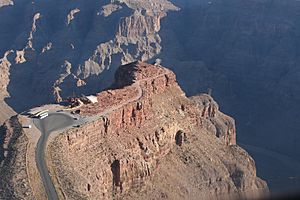Bat Cave mine facts for kids
The Bat Cave guano mine was a very unusual and interesting mining project in the western Grand Canyon in Arizona. It was located high up, about 800 feet (240 m) above Lake Mead. This natural cave was home to many bats, and over time, a lot of their droppings, called guano, built up inside. People wanted to collect this guano because it was rich in nitrogen and could be used as a valuable fertilizer.
Contents
Mining for Guano
Finding the Cave
The Bat Cave was first found in the 1930s by someone boating by. Before the main company took over, a few groups tried to mine the guano, but they weren't successful.
The U.S. Guano Corporation's Big Plan
Around 1957, a company called the U.S. Guano Corporation bought the cave. A mining engineer thought there might be as much as 100,000 tons of guano inside! So, the company made a huge and expensive plan to get it out.
Building the Tramway
First, they built a small airstrip on a sandbar in the Colorado River. All the tools and machines they needed were flown in by plane. Then, they built an amazing aerial tramway (like a cable car system) from the mine all the way up to Guano Point on the South Rim of the canyon. The main building for the cable was on land rented from the Hualapai tribe.
An Incredible Cable Car Ride
This tramway was truly impressive. It stretched 7,500 feet (2,300 m) across the river and lifted the guano 2,500 feet (760 m) straight up! They used about 30,000 feet (9,100 m) of thick steel cable. The cable car was big enough to carry 2,500 pounds (1,100 kg) of guano. Miners also rode this same car to get to and from work inside the cave.
How They Mined the Guano
Inside the cave, they used a giant industrial "vacuum cleaner" with ten-inch hoses to suck up the guano. Once the guano reached the top by tramway, trucks took it to Kingman, Arizona, where it was packaged and sold as fertilizer.
Challenges and Problems
Building the tramway took 14 months, and it wasn't easy. One time, when they were tightening the main cable, a part broke. This caused 9,850 feet (3,000 m) of cable to fall into the canyon! They had to order a new cable and string it all over again. After mining started, the 20,000 feet (6,100 m) pull-cable wore out quickly and also needed to be replaced. All these problems made the company spend a lot of money, about $3.5 million in total.
A Disappointing Discovery
Sadly, the mining engineer's guess about how much guano was in the cave was very wrong. Instead of 100,000 tons, there was only about 1,000 tons of useful guano. Most of the cave was filled with worthless rock.
The Mine in a Movie
In 1959, the tramway was even used in a movie called Edge of Eternity. The exciting ending of the film showed a fight happening on a U.S. Guano cable car high above the Grand Canyon!
End of Mining
Because there was so little guano, mining stopped in early 1960. It simply wasn't making enough money to be worth the effort and cost.
After the Mine Closed
The Jet Incident
A few months after the mine closed, something unusual happened. A U.S. Air Force jet was flying too low and fast through the canyon. It accidentally hit the tramway cable, damaging its wing and breaking the cable! The plane managed to survive, and the U.S. Guano company successfully sued the Air Force for damaging their property. This helped them get back some of the money they had lost.
Becoming Part of the Park
In 1975, the abandoned mine area became part of Grand Canyon National Park. The National Park Service thought about removing the old tramway parts from the park. However, many people protested because they wanted to keep these interesting historical pieces. As of 2007, you can still see some parts of the old mining operation at Bat Cave and on the South Rim within the Hualapai Indian Reservation.
Guano Point Today
Today, Guano Point is a popular spot for helicopter and plane tours from Las Vegas, Nevada. Tourists can visit and see the remains of the old mining operation. Tour companies pay fees to the Hualapai tribe, and the tribe even offers a barbecue lunch near the old tramway building as part of their Grand Canyon West tourist business.
 | Claudette Colvin |
 | Myrlie Evers-Williams |
 | Alberta Odell Jones |


